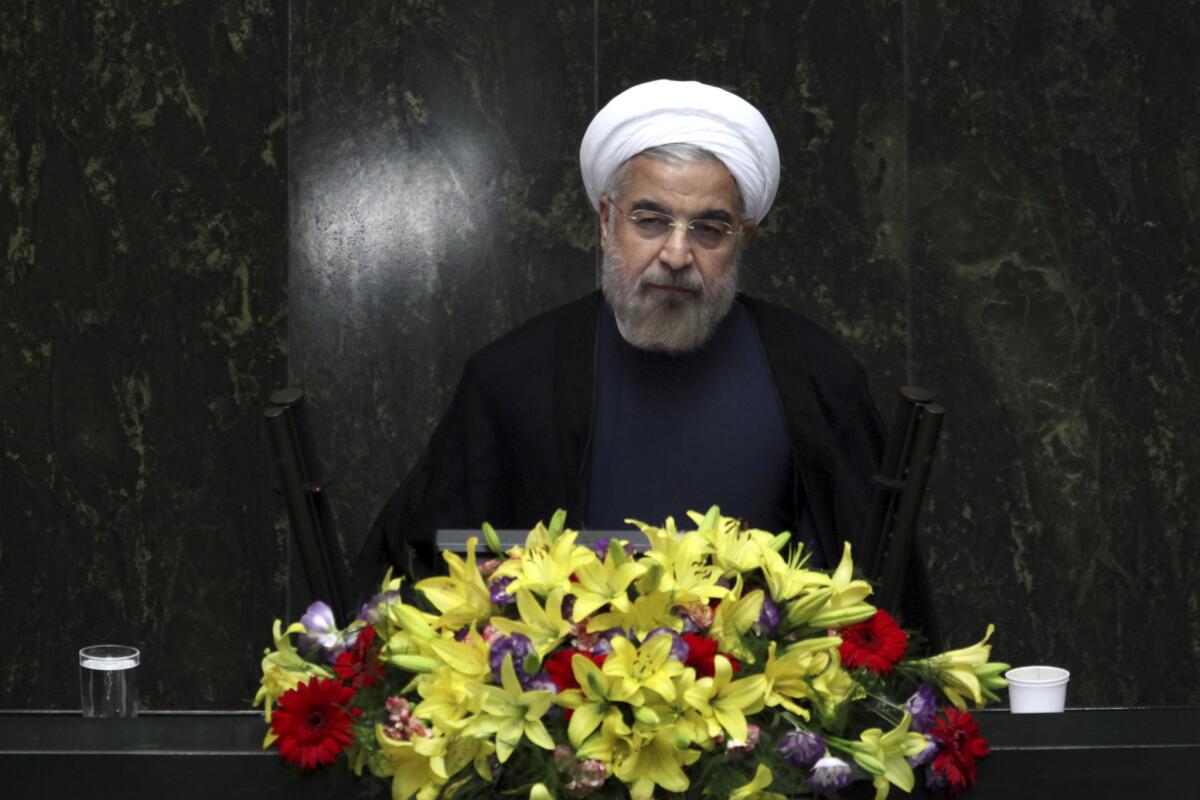Iran still progressing on its nuclear program, U.N. says

- Share via
WASHINGTON — Iran is making steady progress in its disputed nuclear program and has installed more than 1,000 advanced centrifuges at its main uranium enrichment facility, the United Nations nuclear watchdog agency reported Wednesday.
The quarterly report – the first since President Hassan Rouhani was elected in June – also said that Iran continues to stonewall U.N. efforts to determine the military dimensions of its nuclear program.
The findings by the International Atomic Energy Agency indicate few changes in Iran’s efforts, although they mostly cover the period prior to Rouhani’s inauguration Aug. 3.
Rouhani, a relative moderate, has called for “greater transparency” on the nuclear program and a resumption of negotiations with the United States and other world powers.
In what U.S. officials were likely to see as a positive development, none of the new centrifuges installed at the underground Natanz complex are yet enriching uranium, the key material in a nuclear weapon, the report found. The advanced centrifuges, if employed, could enrich uranium more quickly than Iran’s older systems.
Iran’s stockpile of medium-enriched uranium from other facilities increased only slightly from May, to 409 pounds. The total remains well below the approximately 529 pounds needed to produce enough highly enriched uranium for a single nuclear device.
Israeli Prime Minister Benjamin Netanyahu has said that threshold represents a “red line” that could trigger an Israeli military strike on Iranian targets.
Iran says its nuclear program is for peaceful purposes, and U.S. intelligence officials believe the ruling clerics in Tehran have not decided whether to produce a nuclear weapon.
The election of Rouhani, a legal scholar, to succeed hard-line conservative Mahmoud Ahmadinejad raised hopes in the West that Iran would take a more pragmatic approach and seek to resolve the standoff over its nuclear program. Washington and its allies have imposed a web of punishing sanctions that have crippled the Iranian economy.
The Institute for Science and International Security, a nonpartisan research group that tracks Iran’s nuclear program, called the latest IAEA report “a mixed bag of developments.”
Iran also faced construction delays on a heavy water reactor in the city of Arak, which could produce plutonium for nuclear weapons. Previously, Iran had said that the reactor would be ready to begin operations in early 2014, but officials told the IAEA that was “not achievable.”
Iran also continued to block U.N. access to Parchin, a military-industrial site outside Tehran that experts believe may have been used to conduct nuclear-related experiments. U.N. inspectors have long sought access to Parchin to determine whether Iran was testing high explosives meant for use in a nuclear warhead.
Iran has called the allegations of nuclear activity at Parchin “baseless” but inspectors say much of the site has been bulldozed, and parts were paved over, making it difficult to determine what occurred there.
ALSO:
Militants in Afghanistan launch attacks against NATO
Syria chemical weapons response poses major test for Obama
Ex-Salvadoran commander suspected in priests’ killings jailed in U.S.
Twitter: @sbengali
More to Read
Sign up for Essential California
The most important California stories and recommendations in your inbox every morning.
You may occasionally receive promotional content from the Los Angeles Times.











